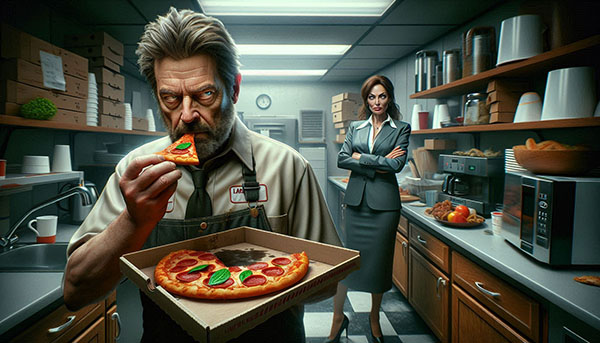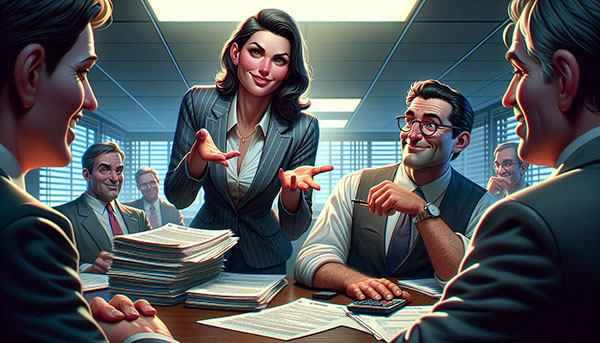By: John S. Morlu II, CPA
Scene: Welcome to Johnson & Co., a small but bustling office that mirrors the complexities of the broader world. Here, employees aren’t just working—they’re living out Lawrence Kohlberg’s stages of moral development in real-time. From the CEO to the interns, let’s dive into the absurdity of office life as seen through the lens of moral philosophy.
Act 1: The Survival of the Fittest (50%) – The Preconventional Crowd
Characters:
- Larry the Janitor: The office’s resident scavenger, always on the lookout for leftovers in the breakroom. He’s not malicious, just a man doing what he must to get by.
- Rhonda the Receptionist: A master of office politics, she knows everyone’s secrets and uses them to her advantage. She has her own unwritten rules and thrives on the little power plays that keep her on top.
Scene:
It’s a typical Wednesday afternoon at Johnson & Co., and the office kitchen is a battlefield. The remnants of last night’s pizza party have become the focal point of a silent struggle. Larry the Janitor spots the last slice hidden behind some Tupperware, his mouth watering at the thought of a free meal.
Larry: (Muttering to himself) “It’s been here all day, and no one’s claimed it. If I don’t take it, someone else will. It’s survival of the fittest out here.”
As Larry reaches for the pizza, Rhonda the Receptionist glides in, her heels clicking ominously on the tiled floor. She’s seen this scenario play out before and knows just how to turn it to her advantage.
Rhonda: (Sweetly, but with a hint of menace) “Larry, dear, you wouldn’t be taking that last slice, would you? Remember, I know who finished off the boss’s cheesecake last week. Wouldn’t want that little tidbit to slip out, now would we?”
Larry freezes, the moral dilemma hanging in the air. On one hand, he’s hungry and the pizza is right there. On the other, Rhonda’s got dirt on him, and he knows she won’t hesitate to use it. He’s faced with a choice: take the pizza and risk exposure, or back down and live to scavenge another day.
Larry: (Nervously grinning) “You wouldn’t really tell on me, would you? But hey, how about we split it? That way, we both win.”
Rhonda considers this for a moment, calculating her next move. It’s not about the pizza—it’s about maintaining her control over the office dynamics.
Rhonda: (Smiling) “You’ve got yourself a deal, Larry. Just remember, it pays to have friends in high places.”
And so, the Preconventional thinkers strike a deal, their actions driven by immediate needs and the unspoken rule of self-preservation. In their world, morality is a luxury they can’t afford—survival is the name of the game.
Act 2: Legalistic Thinkers (45%) – The Conventional Clan
Characters:
- Connie the Compliance Officer: The embodiment of corporate legality, Connie lives and breathes rules. She believes that as long as something is legal, it’s right, and she’s known for her unyielding adherence to the company handbook.
- Tom the Tax Guy: A man of numbers and codes, Tom is a wizard with tax deductions. He’s not here to question morality—his job is to minimize costs and maximize returns, all within the bounds of the law.
Scene:
The conference room is bathed in the glow of fluorescent lights as Connie and Tom pore over a stack of legal documents. The boss has tasked them with finding a way to cut costs through creative tax deductions. The solution they’ve found is perfectly legal, but it’s one of those gray areas that makes even the most seasoned professionals pause.
Connie: (Confidently) “According to Section 179, we can deduct these new equipment purchases this year, even though they won’t be in use until next quarter. It’s a loophole, sure, but it’s there for us to use.”
Tom: (Nodding enthusiastically) “Absolutely, Connie. The law’s the law, and if the IRS says it’s okay, then who are we to argue? The boss is going to love the savings.”
They exchange a look of mutual understanding—this is their moment to shine. They’re the guardians of the company’s financial well-being, armed with the mighty power of legal knowledge. In their minds, morality is synonymous with legality. If the law permits it, it must be right.
Connie: (With a hint of pride) “You know, some people might say we’re cutting corners, but as long as we’re within the legal boundaries, it’s not our concern. The law is clear, and that’s all that matters.”
Tom: (Grinning) “Exactly. We’re not paid to question ethics—we’re paid to follow the rules and save the company money. And if we get a nice bonus out of it, well, that’s just a perk of doing our jobs well.”
The Conventional Clan moves forward with their plan, fully convinced of its righteousness. They are the pillars of the company, upholding the structure of legality even if it sometimes means bending the spirit of the law. Their world is black and white, and they see no reason to question it.
Act 3: Beyond Legalism (5%) – The Postconventional Heroes
Characters:
- Richard the HR Guru: The office’s moral compass, Richard believes in doing what’s right, even when it’s not easy. He’s known for his empathy and his belief that people should come before profits.
- Sandra the Senior Strategist: A forward-thinker, Sandra is always challenging the status quo. She’s the one who asks, “Just because we can, does that mean we should?” Her dedication to ethical decision-making often puts her at odds with the more pragmatic members of the team.
Scene:
Richard and Sandra are in Richard’s office, discussing a recent decision to lay off several employees as part of a cost-cutting measure. The decision was legal, and it made financial sense, but something about it doesn’t sit right with either of them.
Sandra: (Frustrated) “I get that the layoffs were necessary from a financial standpoint, but did we really have to let Marge go right before her retirement? She’s been with the company for 30 years, Richard. There’s got to be a better way.”
Richard: (Sighing) “I know, Sandra. It doesn’t feel right to me either. We should be considering the human impact of our decisions, not just the bottom line. But the higher-ups see numbers, not people.”
Sandra: (Determined) “Well, maybe it’s time they start seeing people. I’m going to talk to the boss. We can find another solution, one that doesn’t involve tossing loyal employees aside just because it’s the easiest option.”
Richard nods, admiring Sandra’s courage. He’s been in the game long enough to know that ethical decisions are rarely the easiest ones, but they’re always the right ones. Together, they represent the 5% of the office that operates on a different level—a level where actions are guided by a deep sense of right and wrong, not just what’s written in the company policy manual.
Richard: (Encouragingly) “You’ve got a good heart, Sandra. We need more people like you who are willing to challenge the system and push for what’s right. It’s not just about doing what’s legal—it’s about doing what’s ethical.”
Sandra: (Smiling) “Let’s hope we can convince the others. It’s not enough to just follow the law. We need to lead by example and show that there’s a better way to do business.”
And so, the Postconventional Heroes set out on their quest, driven by a higher sense of purpose. They know they’re in the minority, but they also know that change starts with a single step, and they’re willing to take it.
Epilogue:
The office of Johnson & Co. is a microcosm of the broader world, where people navigate their own moral compasses, often clashing with those who see things differently. The Survivalists scavenge and plot, driven by immediate needs and self-preservation. The Legalists follow the letter of the law, confident in their righteousness as long as they stay within the boundaries of legality. And the Postconventional Heroes strive to rise above it all, pushing for ethical decisions that consider the greater good, even when it’s not the easiest path.
In this satirical office drama, the characters remind us that morality isn’t just about survival or following rules—it’s about challenging ourselves to think beyond the obvious, to question the status quo, and to strive for something better.
So, the next time you’re faced with a tough decision at work, ask yourself: Which stage are you in? And more importantly, which stage do you want to be in?
Author: John S. Morlu II, CPA is the CEO and Chief Strategist of JS Morlu, leads a globally recognized public accounting and management consultancy firm. Under his visionary leadership, JS Morlu has become a pioneer in developing cutting-edge technologies across B2B, B2C, P2P, and B2G verticals. The firm’s groundbreaking innovations include AI-powered reconciliation software (ReckSoft.com) and advanced cloud accounting solutions (FinovatePro.com), setting new industry standards for efficiency, accuracy, and technological excellence.
JS Morlu LLC is a top-tier accounting firm based in Woodbridge, Virginia, with a team of highly experienced and qualified CPAs and business advisors. We are dedicated to providing comprehensive accounting, tax, and business advisory services to clients throughout the Washington, D.C. Metro Area and the surrounding regions. With over a decade of experience, we have cultivated a deep understanding of our clients’ needs and aspirations. We recognize that our clients seek more than just value-added accounting services; they seek a trusted partner who can guide them towards achieving their business goals and personal financial well-being.
Talk to us || What our clients says about us





